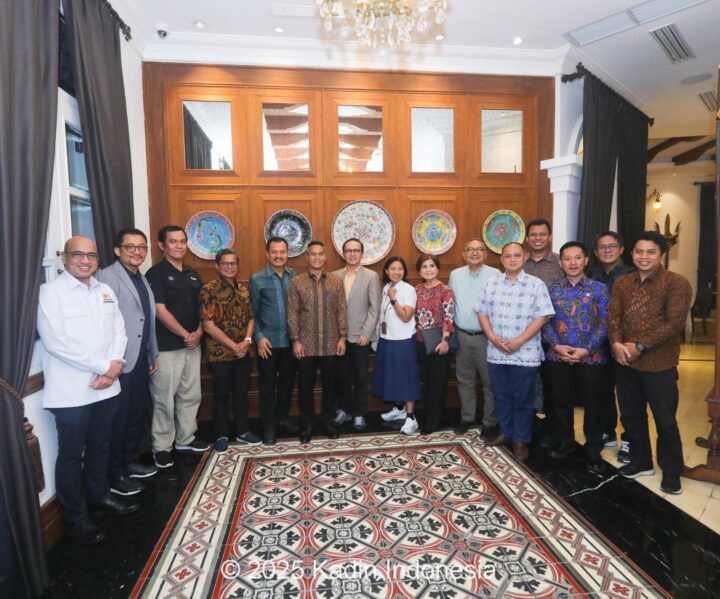
Jakarta - In support of President Prabowo Subianto’s grand vision to transform Indonesia into a prosperous, independent, strong, and great nation, the Indonesian Chamber of Commerce and Industry (Kadin) held a four-day retreat at the Military Academy in Magelang, Central Java, from Thursday (August 7) to Sunday (August 10, 2025).
The retreat brought together 250 Kadin members from across the country to strengthen the spirit of Indonesia Incorporated a call for collective collaboration and mutual support—in aligning with the President’s national vision and supporting government programs aimed at achieving 8% economic growth, national self-reliance, and social justice for all Indonesians. With its vast natural and human resources, Indonesia has the potential to become economically self-sufficient, prosperous, and globally competitive.
“To understand and internalize the President’s grand vision, Kadin needed a dedicated, reflective moment hence this retreat,” said Kadin Indonesia Chairman Anindya Novyan Bakrie, during a dinner with chief editors of leading national media outlets in Jakarta on Monday (August 4, 2025).
President Prabowo’s vision “Together for an Advanced Indonesia Toward a Golden Indonesia 2045” is the foundation of his 2024–2029 administration. It aims to position Indonesia as an advanced, strong, independent, just, and prosperous nation by the time it celebrates its centennial of independence in 2045.
The President has consistently emphasized the value of togetherness, which must be reflected through Indonesia Inc., a spirit of national collaboration. This vision, Anindya stressed, cannot be realized by the government alone it requires the active participation of all stakeholders, especially the business community represented by Kadin.
“From the national to regional levels, Kadin members must become resilient entrepreneurs business leaders who are not only globally-minded but also nationally grounded committed to improving performance and elevating themselves to the national and international stage,” Anin stated.
To bring this vision to life, the President has introduced Asta Cita, or eight noble aspirations, which serve as the guiding mission of his administration. He has also laid out 17 priority programs and eight quick wins. Recognizing Indonesia’s economic gaps, the President has launched large-scale and strategic programs.
In the investment sector, the President established the Indonesia Sovereign Investment Authority, Danantara Indonesia, tasked with consolidating and optimizing government investments to fuel national economic growth.
To stimulate grassroots economic activity, the President initiated the creation of 80,081 Merah-Putih Village/Kelurahan Cooperatives. For the 2026 fiscal year, the government has allocated IDR 457.5 trillion sourced from the 2024 budget surplus (SAL) to support this program.
Other large-scale initiatives include the Free Nutritious Meals Program (MBG), Gotong Royong Clinics for free health screenings, the Three Million Homes Program including the renovation of uninhabitable homes and the Migrant Worker Deployment Program. These programs are being rolled out intensively.
“The President always emphasizes that all government programs must have a tangible, positive impact on the people,” Anin stated.
According to Anin, President Prabowo places great importance on improving the welfare of the lower and middle-income segments. Another major initiative is the expansion of the People’s Business Credit (KUR) program, which the President has directed toward more productive sectors such as agriculture, livestock, fisheries, and manufacturing. He has also reaffirmed his commitment to achieving sovereignty in agriculture and energy.
Historically, KUR loans have been concentrated in trade (approximately 48%) and services (around 14%). Under President Prabowo, however, new KUR schemes have been introduced including Housing KUR and KUR for MBG kitchens. These funds can be used for home renovations and to support micro and small enterprises involved in the MBG program.
“The President’s commitment goes beyond massive national investment it extends to improving grassroots welfare and the nutrition of the next generation, which is expected to become our Golden Generation by 2045,” Anin added.
This year, Indonesia celebrates its 80th year of independence, yet significant challenges remain. The country’s per capita GDP stands at around USD 5,100. Poverty, unemployment, and inequality persist. Job seekers face limited opportunities, layoffs remain a threat, and consumer purchasing power is still not strong enough to boost economic growth. Social justice remains a pressing issue.
In this context, Kadin reaffirms its full support for the government’s vision and work programs. As President Prabowo has stated repeatedly, Indonesia is a great nation, rich in natural and human resources. With such potential, becoming a prosperous and independent nation should be well within reach. Moreover, Indonesia is currently benefiting from a demographic bonus, with 68.9% of the population or 196 million people in the productive age group (15-64 years).
“The retreat in Magelang was a strategic moment for Kadin to reposition itself and strengthen its role as a key partner to the government. In a calm yet spirited atmosphere, business leaders were reinvigorated to fulfill Kadin’s mission as an economic force for the people aligned with the government’s grand vision of building a self-reliant and prosperous Indonesia,” said Anin.
This retreat was not merely a break from routine, but a time for reflection and consolidation a unifying moment for Kadin leaders and members across Indonesia. It reaffirmed Kadin’s role not just as a liaison for the business sector, but as a strategic partner to the government in accelerating growth, creating jobs, reducing inequality, and strengthening national resilience.
All of this is to be realized through the spirit of Indonesia Incorporated a deep collaboration between the state and the private sector with one shared goal: the welfare of all Indonesians.
National Economy
Regional Economy
National Economy
Regional Economy